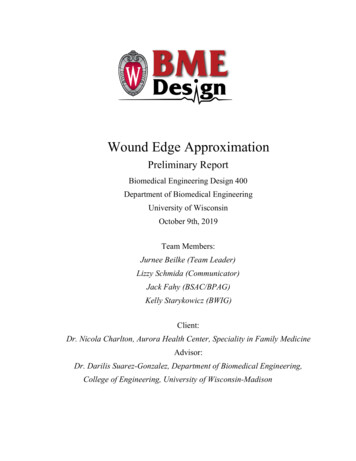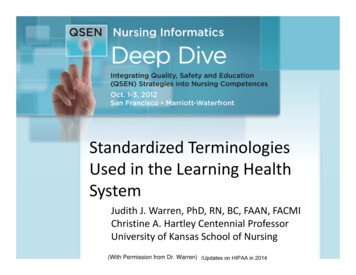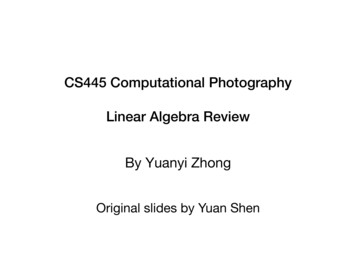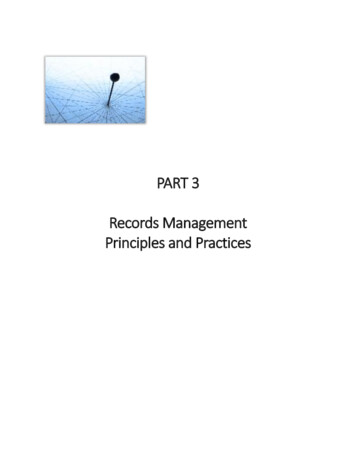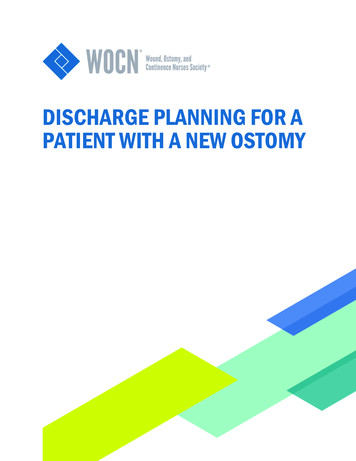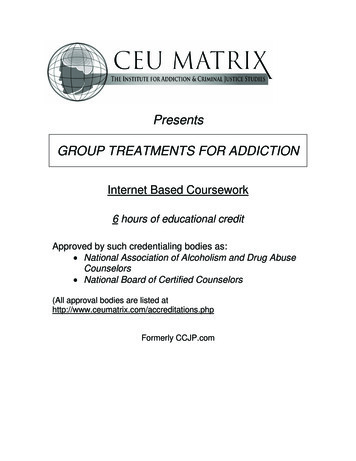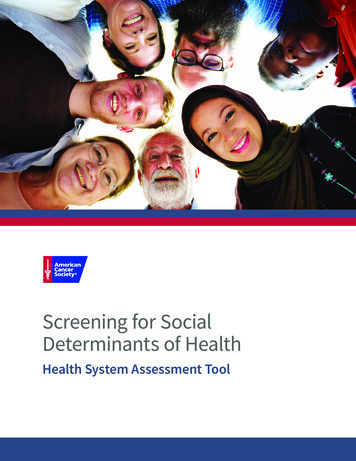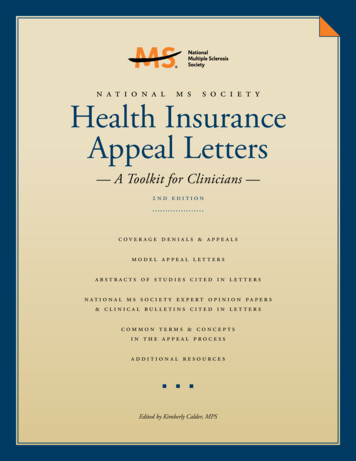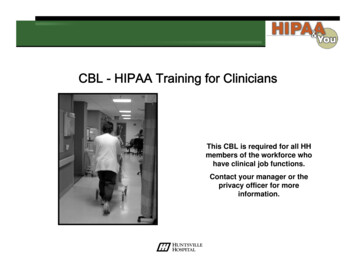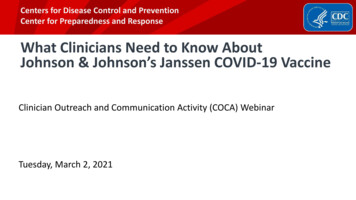
Transcription
Centers for Disease Control and PreventionCenter for Preparedness and ResponseWhat Clinicians Need to Know AboutJohnson & Johnson’s Janssen COVID-19 VaccineClinician Outreach and Communication Activity (COCA) WebinarTuesday, March 2, 2021
To Ask a Question All participants joining us today are in listen-only mode.Using the Webinar System– Click the “Q&A” button.– Type your question in the “Q&A” box.– Submit your question. The video recording of this COCA Call will be posted fo 030221.asp and available to viewon-demand a few hours after the call ends. If you are a patient, please refer your questions to your healthcare provider. For media questions, please contact CDC Media Relations at 404-639-3286, or send an email tomedia@cdc.gov.
Today’s Presenters Sarah Mbaeyi, MD, MPHCDR, U.S. Public Health ServiceMedical OfficerNational Center for Immunization and RespiratoryDiseasesCenters for Disease Control and PreventionSara Oliver, MDLCDR, U.S. Public Health ServiceCo-lead, Advisory Committee for Immunization PracticesCOVID-19 Vaccines Work GroupCOVID-19 ResponseCenters for Disease Control and PreventionKathleen Dooling, MD, MPHMedical OfficerCo-lead, Advisory Committee for Immunization PracticesCOVID-19 Vaccines Work GroupCOVID-19 ResponseCenters for Disease Control and Prevention
ACIP COVID-19 VaccinesWhat Clinicians Need to Know aboutJohnson and Johnson’sJanssen COVID-19 vaccineSara Oliver MD, MSPHSarah Mbaeyi MD, MPHKathleen Dooling MD, MPHMarch 2, 2021For more information: www.cdc.gov/COVID19
Outline:1) Safety and efficacy of Janssen COVID-19 vaccinesDr. Sara Oliver2) Clinical considerations for use of Janssen COVID-19 vaccineDr. Sarah Mbaeyi3) Implementation considerations for Janssen COVID-19 vaccineDr. Kathleen Dooling5
Safety and Efficacy of JanssenCOVID-19 vaccines:Data from Phase III clinical trial6
Summary of the Available Evidence:Vaccine Efficacy The clinical trial demonstrated efficacy against symptomatic, laboratory-confirmedCOVID-19. The overall efficacy was 66.3% (95% CI: 59.9%, 71.8%). For COVID-19 associated hospitalization, 31 events occurred, 29 in the placebo group,2 in the vaccine group. Vaccine efficacy against hospitalization was 93% (95%CI: 71%, 98%). For all-cause deaths, 5 occurred in the vaccine group and 20 in the placebogroup. Vaccine efficacy against all-cause death was 75% (95% CI: 33%, 91%)7
Summary of the Available Evidence:Vaccine Efficacy Preliminary data were available to assess vaccine efficacy againstseroconversion between days 29 and 71, based on the first 7% of specimenstested. Analysis was based on detection of N-binding antibody among persons whoremained asymptomatic and did not have a positive SARS-CoV-2 PCR at anytime in the study. Between four and ten weeks after vaccination with the Janssen COVID-19vaccine, 10/1346 participants (0.7%) seroconverted, compared to 37/1304(2.8%) of those receiving placebo. Vaccine efficacy against seroconversionwas 74% (95% CI: 48%, 87%).8
Summary of the Available Evidence:Vaccine Efficacy Similar efficacy for across age, sex, race, and ethnicity categories, and thosewith underlying medical conditions at 14 days post-vaccination64.7Age 18-64 years76.5Age 65 6White63.7Black64.2With comorbidities67.6Without comorbidities0204060Vaccine Efficacy (%)801009
Summary of the Available Evidence:Vaccine Efficacy Higher efficacy against severe outcomes than for any symptomatic COVID-19*– VE against deaths due to COVID-19: 100% Efficacy estimates for severe outcomes assessed 28 days post vaccinationwere higher: 83.5% for severe disease†, 100% for hospitalization Efficacy against severe disease† remained high across world regions (73-82%*),suggesting protection against severe illness with variant strains†Definition: Respiratory Rate 30, Heart Rate 125, SpO2 93% on room air at sea level or PaO2/FIO2 300 mm Hg; OR respiratory failure orAcute Respiratory Distress Syndrome (ARDS), defined as needing high-flow oxygen, non-invasive or mechanical ventilation, or ECMO; ORevidence of shock (systolic blood pressure 90mmHg, diastolic BP 60mmHg or requiring vasopressors); OR significant acute renal, hepatic orneurologic dysfunction; OR admission to an intensive care unit or death*Assessed 14 days post vaccination10
Summary of the Available Evidence:Safety and Reactogenicity Serious adverse events were reported in a similar proportion amongrecipients of vaccine and placebo (0.4% vs 0.4%). Severe reactions were more common in vaccine recipients; any grade 3reaction was reported by 2.5% of vaccinated versus 0.7% of placebogroup.11
Summary of the Available Evidence:Safety and Reactogenicity Local reactions within 7 days occurred in 50% vaccine recipients– Pain at the injection site most common Systemic reactions within 7 days occurred in 55% vaccine recipients– Headache, fatigue, and myalgia most common Most symptoms resolved after 1-2 days12
Summary of Available Evidence: ReactogenicityREACTOGENICITY BY AGE GROUP,PHASE III TRIAL DATA (N 3356 VACCINE, 3380 .3%17.4%33.1%15.6%12.8%0.7%ANYPAINLOCAL AE, ANY GRADE18-59 years, VaccineAbbreviations, AE Adverse Events18-59 years, PlaceboANY3.1%0.5%FEVERSYSTEMIC AE, ANY GRADE 60 years, Vaccine 60 years, Placebo13
Summary of Available Evidence: ReactogenicityGRADE 3 REACTOGENICITY BY AGE GROUP,PHASE III TRIAL DATA (N 3356 VACCINE, 3380 3%0.2%0.0%ANYPAINLOCAL AE, GRADE 318-59 years, VaccineAbbreviations, AE Adverse Events0.0%ANY0.1%0.0%FEVERSYSTEMIC AE, GRADE 318-59 years, Placebo 60 years, Vaccine 60 years, Placebo14
Summary of the Available Evidence:Safety and ReactogenicityAdverse event imbalances of note: Urticaria events: vaccine n 5; placebo n 1– Possibly related to the vaccine* Tinnitus: vaccine n 6; placebo n 0– Insufficient data to determine causal relationship* Thromboembolic events: vaccine n 15; placebo n 10– Many of the participants had predisposing conditions. FDA determined contributoryeffect of vaccine not excluded, insufficient data to determine causal relationship*– FDA recommends surveillance for further evaluation of thromboembolic events*Causal determination per FDA15
Summary of the Evidence:All authorized COVID-19 vaccines No trials compared efficacy between vaccines in the same study at the same time– All Phase 3 trials differed by calendar time and geography– Vaccines were tested against different circulating variants and in settings with differentbackground incidence All authorized COVID-19 vaccines demonstrated efficacy (range 65 to 95%) againstsymptomatic lab-confirmed COVID-19 All authorized COVID-19 vaccines demonstrated high efficacy ( 89%) againstCOVID-19 severe enough to require hospitalization In the vaccine trials, no participants who received a COVID-19 vaccine died fromCOVID-19– The Moderna and Janssen trials each had COVID-19 deaths in the placebo arm16
Clinical Considerations for Use ofthe Janssen COVID-19 vaccine17
Clinical considerations for use of mRNA COVID-19 vaccines CDC clinical considerations for mRNA COVID-19vaccines published previously:– ct/clinical-considerations.html Clinical considerations are being updated toinclude Janssen COVID-19 vaccine– Viral vector COVID-19 vaccineSign up to receive email updates when clinical considerations are updated: uct/clinical-considerations.html18
Summary of the Janssen vaccine characteristics Authorized for persons aged 18 years Intramuscular injection (0.5 ml) Vaccine shipment and storage (3 months) at refrigerator temperatures (2-8oC)* Single-dose series No diluent required* Long-term storage at standard freezer temperatures (-20oC)19
Interchangeability of COVID-19 vaccine products Any COVID-19 vaccine can be used when indicated; no product preference COVID-19 vaccines are not interchangeable– Safety and efficacy of a mixed series has not been evaluated If first dose of mRNA COVID-19 vaccine was received but patient unable to competeseries with same or different mRNA vaccine– Single dose of Janssen COVID-19 vaccine may be administered at minimum interval of 28days from mRNA dose*– Considered to have received valid, single-dose Janssen vaccination, not mixed vaccinationseries (mRNA/viral vector)*Persons with a contraindication to mRNA COVID-19 vaccines have a precaution to Janssen COVID-19 vaccine. In these patients, vaccination should be undertaken in anappropriate setting under the supervision of a health care provider experienced in the management of severe allergic reactions. Consider referral to allergist-immunologist.20
Coadministration of COVID-19 vaccines with other vaccines Currently authorized COVID-19 vaccines are all inactivated vaccines COVID-19 vaccine should be administered alone with minimum interval of 14 daysbefore or after administration of other vaccines A shorter interval may be used in situations where the benefits of vaccination aredeemed to outweigh the potential unknown risks (e.g., tetanus toxoid vaccine forwound management, etc.) or to avoid barriers or delays to vaccination21
COVID-19 vaccination of persons with underlying medicalconditions Any currently authorized COVID-19 vaccine can be administered to persons withunderlying medical conditions who have no contraindications to vaccination, including:– Immunocompromised persons– People with autoimmune conditions– People with history of Guillain-Barré syndrome, Bell's palsy, dermal filler use Clinical trials demonstrate similar safety and efficacy profiles in persons with underlyingmedical conditions, including those that place them at increased risk for severe COVID19, compared to persons without nditions.html22
COVID-19 vaccination of immunocompromised persons Persons with HIV infection, other immunocompromising conditions, or who takeimmunosuppressive medications or therapies might be at increased risk for severeCOVID-19 Immunocompromised persons may receive COVID-19 vaccine unless otherwisecontraindicated– All currently authorized vaccines are inactivated vaccines Individuals should be counseled about:– Unknown vaccine safety and efficacy profiles in immunocompromised persons– Potential for reduced immune responses– Need to continue to follow current guidance to protect themselves against -by-product/clinical-considerations.html#phrecs23
COVID-19 vaccination of pregnant people COVID-19 and pregnancy– Increased risk of severe illness (ICU admission, mechanical ventilation and death)– Might be an increased risk of adverse pregnancy outcomes Currently limited data on safety of COVID-19 vaccines in pregnant people– No concerns demonstrated in animal developmental and reproductive toxicity (DART) studies– Janssen adenovirus vector platform previously used for other clinical development programsthat included pregnant people, including a large-scale Ebola vaccine trial Currently authorized COVID-19 vaccines are all inactivated vaccines Clinical trials to evaluate safety and efficacy of COVID-19 vaccines in pregnant peopleplanned or l-recs/special-situations.html24
COVID-19 vaccination of pregnant people Pregnant people may choose to receive COVID-19 vaccine when eligible– A conversation between the patient and their clinical team may assist with decision, but isnot required– Conversation should consider: Level of COVID-19 community transmission Personal risk of contracting COVID-19 Risks of COVID-19 to patient and fetus Efficacy and side effects of vaccine Limited data about vaccine during pregnancy25
Contraindications and precautions for COVID-19 vaccinesCONTRAINDICATION TO VACCINATIONHistory of the following: Severe allergic reaction (e.g., anaphylaxis) aftera previous dose or to component of thevaccine† Immediate allergic reaction* of any severityafter a previous dose or known (diagnosed)allergy to a component of the vaccine†Actions: Do not vaccinate. Consider referral to allergist-immunologist. Consider other vaccine alternative.†† SeePRECAUTION TO VACCINATIONAmong persons without a contraindication, a historyof: Any immediate allergic reaction* to othervaccines or injectable therapies‡Actions: Risk assessment Consider referral to allergist-immunologist 30-minute observation period if vaccinatedMAY PROCEED WITH VACCINATIONAmong persons without a contraindication orprecaution, a history of: Allergy to oral medications (including the oralequivalent of an injectable medication) History of food, pet, insect, venom,environmental, latex, etc., allergies Family history of allergiesActions: 30-minute observation period: persons withhistory of anaphylaxis (due to any cause) 15-minute observation period: all otherpersonsAppendix C for a list of ingredients. Persons with a contraindication to one of the mRNA COVID-19 vaccines should not receive doses of either of the mRNA vaccines (Pfizer-BioNTech or Moderna).allergic reaction to a vaccine or medication is defined as any hypersensitivity-related signs or symptoms consistent with urticaria, angioedema, respiratory distress (e.g., wheezing, stridor), or anaphylaxis that occurwithin four hours following administration.‡Includes persons with a reaction to a vaccine or injectable therapy that contains multiple components, one of which is a vaccine component, but in whom it is unknown which component elicited the immediate allergic reaction.#Polyethylene glycol (PEG) is an ingredient in both mRNA COVID-19 vaccines, and polysorbate 80 is an ingredient in Janssen COVID-19 vaccine. PEG and polysorbate are structurally related, and cross-reactive hypersensitivitybetween these compounds may occur. Persons with a contraindication to mRNA COVID-19 vaccines (including due to a known [diagnosed] allergy to PEG) have a precaution to Janssen COVID-19 vaccine. Among persons whoreceived one mRNA COVID-19 dose but for whom the second dose is contraindicated, consideration may be given to vaccination with Janssen COVID-19 vaccine (administered at least 28 days after the mRNA COVID-19 dose).Persons with a contraindication to Janssen COVID-19 vaccine (including due to a known [diagnosed] allergy to polysorbate) have a precaution to mRNA COVID-19 vaccines. In patients with these precautions, vaccination should beundertaken in an appropriate setting under the supervision of a health care provider experienced in the management of severe allergic reactions. Consider referral to allergist-immunologist.* Immediate
Implementation Considerations for Use ofthe Janssen COVID-19 vaccine27
Janssen COVID-19 Vaccine ACIP states no preference for any of the three authorized vaccines Results of Janssen Phase III trials not comparable with mRNA vaccines– Different calendar timeDifferent circulating variants– Different geographyHigher background incidence Strong protection against severe COVID-19– 93% VE against hospitalizations (2 cases in vaccinated vs. 29 in placebo)– No COVID-associated deaths in vaccinated vs. 7 in placebo28
Janssen COVID-19 VaccineHow does it best fit?Characteristics of the vaccine 1 dose Transport, and storage (x3m) at 2-8oC No diluent/reconstitution necessary29
Janssen COVID-19 VaccineConsiderations for utilizationWhere?Who? Mobile/pop-up clinics Newly established vaccineadministration sites Sites that do not have freezercapacity (e.g. adult HCP offices) People who want to be fullyvaccinated quickly People who don’t want to returnor can’t return for a second dose Mobile populations orhomebound populations30
COVID-19 Vaccine Work Group considerations During a pandemic, under EUA, offering Janssen COVID-19 vaccine topersons 18 years and older, according to established allocation andeligibility recommendations in a given jurisdiction, is an effectiveimplementation strategy––––Allows for jurisdictional flexibilitySupports rapid vaccination and increases in population immunityDoes not single out any groupAllows individuals to be vaccinated with the earliest vaccine available31
For more information, contact CDC1-800-CDC-INFO (232-4636)TTY: 1-888-232-6348 www.cdc.govThank youThe findings and conclusions in this report are those of the authors and do not necessarily represent theofficial position of the Centers for Disease Control and Prevention.
To Ask a Question Using the Zoom Webinar System– Click on the “Q&A” button.– Type your question in the “Q&A” box.– Submit your question. For media questions, please contact CDC Media Relations at 404-639-3286or email media@cdc.gov.
Today’s COCA Call Will Be Available On-Demand When: A few hours after the live call What: Video recording Where: On the COCA Call webpage fo 030221.asp
Upcoming COCA Calls When: Thursday, March 11 at 2 PM ET Topic: The Role of Telehealth in Expanding Access to Healthcare During theCOVID-19 Pandemic: Considerations for Vaccine Uptake and Monitoring forAdverse Events For more 021/callinfo 031121.asp Subscribe to receive notifications about upcoming COCA calls or other COCAproducts and services at emergency.cdc.gov/coca/subscribe.asp Share call announcements with colleagues
COCA Products & ServicesCOCA Call Announcements contain all informationsubscribers need to participate in COCA Calls. COCACalls are held as needed.Monthly newsletter that provides information on CDCtraining opportunities, conference and trainingresources, the COCA Partner Spotlight, and theClinician Corner.As-needed messages that provide specific, immediateaction clinicians should take. Contains comprehensiveCDC guidance so clinicians can easily followrecommended actions.
COCA Products & ServicesMonthly newsletter providing updates on emergencypreparedness and response topics, emerging publichealth threat literature, resources for healthprofessionals, and additional information importantduring public health emergencies and disasters.Informs clinicians of new CDC resources and guidancerelated to emergency preparedness and response. Thisemail is sent as soon as possible after CDC publishesnew content.CDC's primary method of sharing information abouturgent public health incidents with public informationofficers; federal, state, territorial, and local public healthpractitioners; clinicians; and public health laboratories.
Join COCA’s Mailing List Receive information about:– Upcoming COCA Calls– Health Alert Network (HAN) messages– CDC emergency response activations– Emerging public health threats– Emergency preparedness and responseconferences– Training opportunitiesemergency.cdc.gov/coca/subscribe.asp
Join Us On Facebook!
Thank you for joining us today!emergency.cdc.gov/coca
For COVID-19 associated hospitalization, 31 events occurred, 29 in the placebo group, 2 in the vaccine group. Vaccine efficacy against hospitalization was 93% (95% CI: 71%, 98%). For all-cause deaths, 5 occurred in the vaccine group and 20 in the placebo group. Vaccine efficacy against all-cause death was 75% (95% CI: 33%, 91%)


